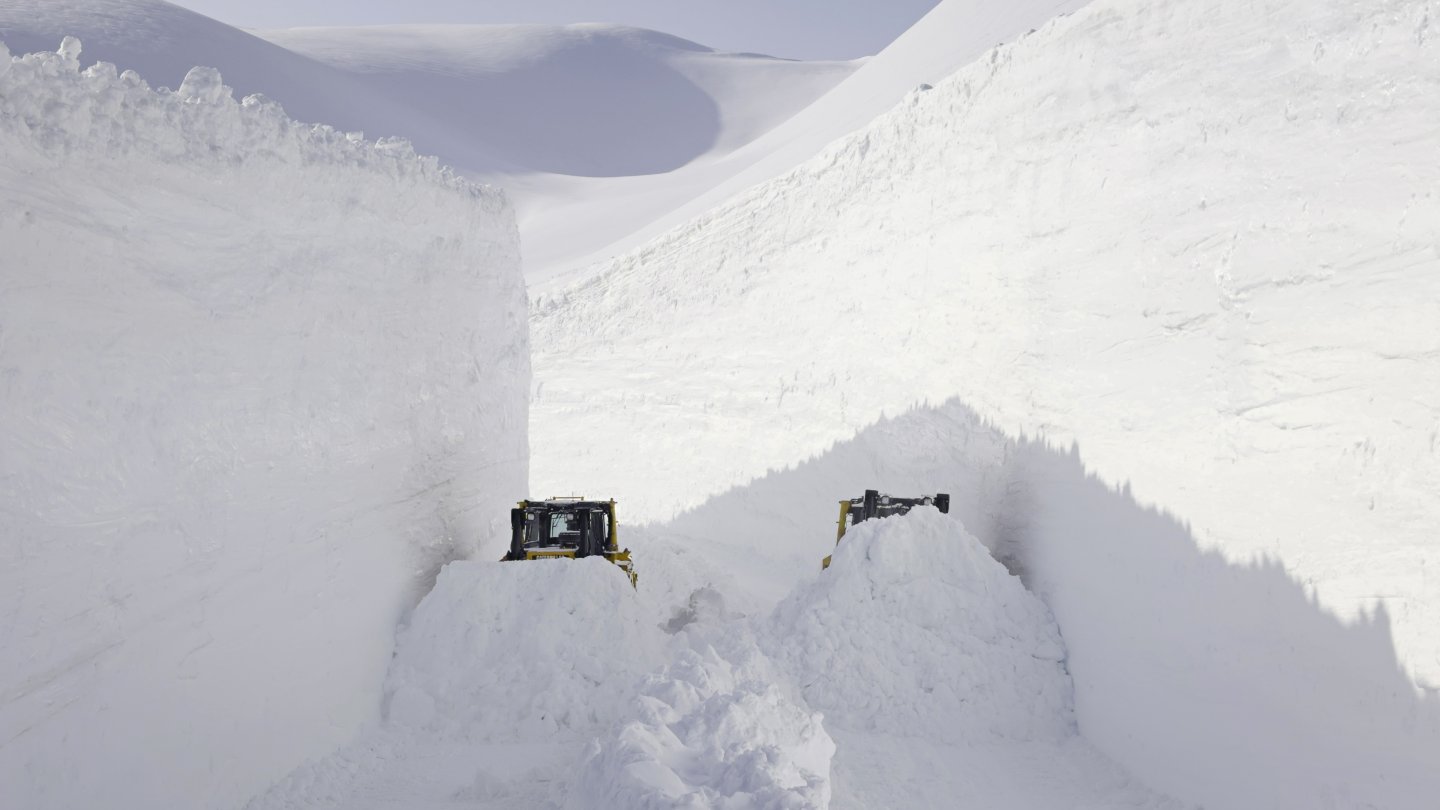Melt
Melt
VERDICT: A meticulous, contemplative sweep of the globe, Nikolaus Geyrhalter’s impressive doc takes stock of humanity’s toil to control ice and snow as the climate crisis advances.
The roar of a trail grooming vehicle, its lights a fuzzy glow through thick pre-dawn snow flurries, introduces us to the world of Austrian filmmaker Nikolaus Geyrhalter’s magnificent-looking, meticulous Melt, which had its international premiere in competition at DOK Leipzig. Filmed over the last four years, it is a collation of icy-weather spots around the globe, from a Japanese village to the Inuvik region of Canada, glaciers and resorts of Europe, and a research station in the Antarctic.
Vast landscapes that might otherwise be silent are the site of toil by humans using machinery and tools to mould and move nature’s snowfalls into manageable formations. The toothy jaws of bulldozers scoop up chunks of powder and metallic shovels shush thick drifts from doorways, as inhabitants wage a cyclical battle to keep nature at bay and mould its contours to their own ends, making it habitable, and even enjoyable as a playground for leisure pursuits. It’s work that has become unpredictable, symptomatic of a human-fuelled climate crisis that is irrevocably changing these places, and wreaking havoc through fluctuating snowfall.
Geyrhalter has, in a career of more than three decades, often focused a broad gaze on the uses and abuses of the earth by humans aggressively shaping their environments and leaving destructive and irrevocable traces, as in his 2016 Homo Sapiens, a haunting collection of abandoned constructions being reclaimed by nature, and 2019’s Earth, which showed the physical transformation of sections of the planet by mining extraction. Easy on the eye and urgent in its environmental implications, Melt should attract similarly wide festival interest.
Melt’s concept is straightforward, even simple, as in a cumulative, matter-of-fact way it shows humans going about their duties in freezing workplaces. They take time out to talk straight to camera about how the snow situation has altered year by year, in a manner devoid of politics or moralising, but all the more effective in its unvarnished description of the daily lived reality of a climate crisis impossible to deny. A rice-growing couple in a village in Japan’s Niigata prefecture who spend cosy evenings with their cat insulated from the cold by a crackling fire reflect on subsistence in a harsh but beloved environment, which is being lost to hotter months and dwindling snow. Such places are breathtaking to behold, but have a treacherous force one must respect to survive, locals point out. Geyrhalter challenges audiences to not just consume the landscape through his magnificent, static long shots, but to understand its fragility, and the terrible power of a natural world thrown out of balance by human hubris.
In resorts in France and Austria skiing can no longer be taken for granted. Artificial snow is manufactured and pumped out, its fabricated blobs a poor imitation of the always-unique star shapes of nature’s slowly formed crystals, and its creation a desperate measure to top up a new scarcity, so that the sporting runs can continue, in commercial fantasylands of winter fun where flouro-suited women with long ponytails lead outdoor dance routines to pounding techno at the bottom of slopes. Even then, some fields have been closed as unsustainable, their chair lifts removed, a full stop to a seasonal rotation of skiers. Visitors to Katnajokull Glacier in Iceland are led into a cave by a guide who explains that it will soon no longer exist, due to the mass of ice’s fast retreat. An impressive, textured soundtrack combines with crisp imagery for an unadorned but palpable sense of place that feels alive and lived-in rather than simply decorative.
The touristic commercialism of these destinations is thrown into sharp relief by a culminating segment at Neumayer Station III in the Antarctic, where residents at a German research outpost reflect on the way that the solidarity of their work wards off loneliness, and the quiet solitude for reflection in such an isolated space creates new realisations about humankind’s chaotic and destructive activities. Here, the dramatic changes underway by record-breaking melting events, which are set to have a catastrophic impact on more populated parts of the globe already absorbing slighter shifts, feel far from abstract to the team in their routine of scientific testing, and place the already ambitiously broad-sweeping survey into a deeper, critical perspective.
Director, Cinematographer: Nikolaus Geyrhalter
Producers: Nikolaus Geyrhalter, Michael Kitzberger, Wolfgang Widerhofer, Markus Glaser
Editor: Gernot Grassl
Sound: Sophia Laggner, Hjalti Bager-Jonathansson, Eva Hausberger, Sergey Martynyuk, Ariane Pellini
Sound Design: Florian Kindlinger, Flora Rajakowitsch
Production company: Nikolaus Geyrhalter Filmproduktion (Austria)
Sales: Outlook Filmsales
Venue: DOK Leipzig (International Documentary Feature Competition)
In Japanese, German, English, French
125 minutes


